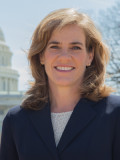 By General Counsel K. Hollyn Hollman
By General Counsel K. Hollyn Hollman
The recent measles outbreak and ensuing conversation about immunizations is not primarily a story about religion or religious exemptions. We are learning, again, that measles is a serious, and sometimes fatal, but preventable disease. The growing number of children not being vaccinated and the increase in the number of reported cases is alarming. In fact, the current outbreak is the worst in decades, raising fears about a disease that had largely been eradicated through widespread and effective immunizations.
News reports about the outbreak have led to examinations of state immunization laws. That’s where religion comes in. Typically, immunization requirements are tied to eligibility for school attendance, and exemptions are rarely claimed. Immunization rates are high and cases of measles remain rare. According to the Centers for Disease Control and Prevention, 23 states had a 95 percent or above vaccination rate for incoming kindergarteners in 2013-2014, with Mississippi leading the way at 99.7 percent.
All 50 states, however, have an exemption for children with medical conditions that warrant special treatment. Forty-eight states — all except Mississippi and West Virginia — have additional exemptions based on personal, religious or philosophical beliefs. In some states, those exemptions have created a substantial at-risk population. For the 2013-2014 school year, Colorado had the highest rate of non-vaccinated incoming kindergarteners at 18.3 percent; California, the site of the current outbreak, had 7.7 percent unvaccinated.
While religion is a common basis for exemptions to state laws regarding children, it does not appear to be the main culprit for the increase in reported measles cases. Few religions believe that children should not be immunized, and the recent trend in avoiding vaccines has been tied to fears of health harms, not religion. The measles outbreak and the prevalence of statutory exemptions based on religion, however, have inspired many to think deeply about religious exemptions to general laws.
The conversation follows on the heels of last year’s most important religious liberty development — the U.S. Supreme Court’s decision in Burwell v. Hobby Lobby Stores, Inc. It is a general principle of religious liberty law that the right to exercise religion sometimes involves providing exceptions to general rules. That principle received new attention, and a fair amount of criticism, when the Court applied the Religious Freedom Restoration Act (RFRA) to a large for-profit retailer’s religious objection to providing certain contraceptive coverage in its employee health plans. Although the Court held that the contraceptive mandate as applied to Hobby Lobby violated RFRA since a less restrictive option for employee coverage existed, it did not hold that the claim for religious exemption will always win.
In the meantime, the measles outbreak provides a straightforward context for the continuing debate about how best to protect the free exercise of religion without harming others. The quintessential compelling governmental interest is protecting health, welfare and safety. In cases involving the health of children, the government’s interest is one of the highest order, not easily susceptible to challenge.
In fact, the majority opinion in Hobby Lobby addressed it directly. Justice Samuel Alito wrote: “Other coverage requirements, such as immunizations, may be supported by different interests (for example, the need to combat the spread of infectious diseases) and may involve different arguments about the least restrictive means of providing them.” This statement demonstrates an understanding that religious liberty — even as protected by RFRA’s high standard — does not require granting religious exemptions to immunization laws or similar interests that are required for public health and safety.
The current spotlight on exemptions in state laws may lead to the repeal of some religious exemptions. Court challenges to create such exemptions are unlikely to win. When the Mississippi Supreme Court rejected religious exemptions for children’s vaccinations in Brown v. Stone (1979), it held that “requiring immunization against certain crippling and deadly diseases particularly dangerous to children … serves an overriding and compelling public interest … not only as a protection of that child but as a protection of the large number of other children comprising the school community.”
While religious views and claims for exemptions are infamously diverse, religious freedom does not require — and in fact should not claim — to support exemptions that harm the state’s most important interests. Protecting children and public health is an interest of the highest order and a clear boundary for understanding the limits of claims for religious exemptions.
From the February 2015 Report from the Capital. Click here to read the next article.





